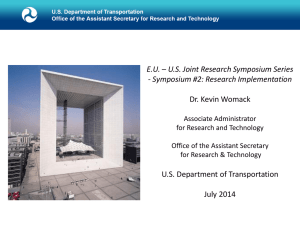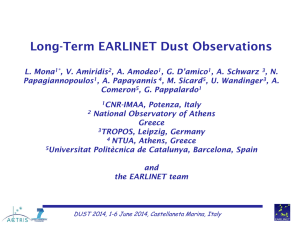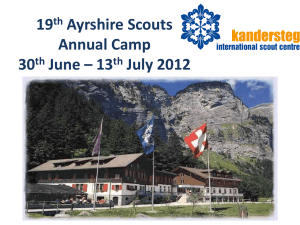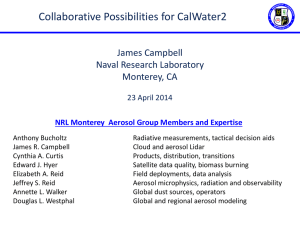EARLINET and CALIPSO - UMBC Atmospheric Lidar Group
advertisement
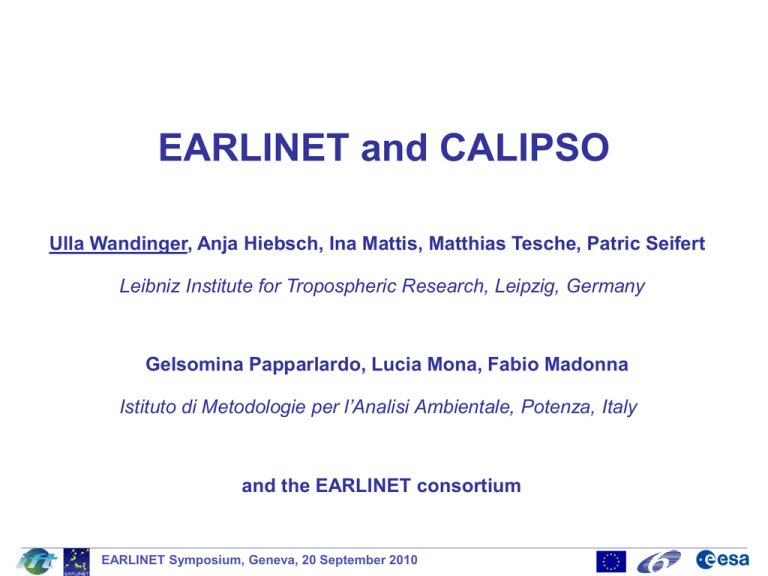
EARLINET and CALIPSO Ulla Wandinger, Anja Hiebsch, Ina Mattis, Matthias Tesche, Patric Seifert Leibniz Institute for Tropospheric Research, Leipzig, Germany Gelsomina Papparlardo, Lucia Mona, Fabio Madonna Istituto di Metodologie per l’Analisi Ambientale, Potenza, Italy and the EARLINET consortium EARLINET Symposium, Geneva, 20 September 2010 Outline • Motivation • EARLINET activities during the CALIPSO mission • Comparison of CALIPSO Level 1 data • ESA-CALIPSO study (Level 2 data) • Multiple-scattering effects • Volcanic aerosol layers • Conclusion and outlook EARLINET Symposium, Geneva, 20 September 2010 Motivation EARLINET offers a unique opportunity for the validation and full exploitation of the CALIPSO mission. • EARLINET provides long-term, quality-assured aerosol data. • Because of its geographical distribution over Europe, EARLINET allows us to investigate a large variety of different aerosol situations with respect to layering, aerosol type, mixing state, and properties in the free troposphere and the local planetary boundary layer [e.g., Ansmann et al. 2003; Matthias et al., 2004; Mattis et al., 2004, 2009; Pappalardo et al., 2004a; Mona et al., 2006; Balis et al., 2003; Wandinger et al., 2004; Amiridis et al., 2005; De Tomasi et al., 2006, Papayannis et al., 2005, 2008, etc.]. • With a network on a continental scale it is also possible to study the representativeness of the limited number of satellite lidar cross sections along an orbit against long-term network observations. • Direct validation of backscatter at 532 and 1064 nm, extinction at 532 nm and depolarization at 532 nm is possible from many EARLINET sites. EARLINET Symposium, Geneva, 20 September 2010 EARLINET – CALIPSO activities • EARLINET started correlative measurements for CALIPSO on 14 June 2006, i.e. at the beginning of the CALIPSO operation. • A strategy for correlative measurements has been defined on the base of the analysis of the ground-track data provided by NASA. • While the majority of EARLINET stations contributed on a voluntary basis to this measurement program in the first two years of the mission, a dedicated ESA activity has supported correlative EARLINET-CALIPSO observations at 16 selected EARLINET stations for period of 18 months from May 2008 – October 2009. • Data exploitation within this study (still ongoing) aims at a long-term aerosol and cloud data base providing type-dependent wavelength conversion factors as well as EARLINET-CALIPSO intercomparison data based on Level 2 profile and layer products. EARLINET Symposium, Geneva, 20 September 2010 EARLINET – CALIPSO publications Pappalardo G., U. Wandinger, L. Mona, A. Hiebsch, I. Mattis, A. Amodeo, A. Ansmann, P. Seifert, H. Linné, A. Apituley, A. L. Arboledas, D. Balis, A. Chaikovsky, G. D’ Amico, F. De Tomasi, V. Freudenthaler, E. Giannakaki, A. Giunta, I. Grigorov, M. Iarlori, F. Madonna, RE. Mamouri, L. Nasti, A. Papayannis, A. Pietruczuk, M. Pujadas, V. Rizi, F. Rocadenbosch, F. Russo, F. Schnell, N. Spinelli, X. Wang and M. Wiegner, EARLINET correlative measurements for CALIPSO: First intercomparison results J. Geophys. Res., 115, D00H19, doi:10.1029/2009JD012147, 2010 Mona L., G. Pappalardo, A. Amodeo, G. D’Amico, F. Madonna, A. Boselli, A. Giunta, F. Russo, V. Cuomo, One year of CNR-IMAA multi-wavelength Raman lidar measurements in correspondence of CALIPSO overpass: Level 1 products comparison Atmospheric Chemistry and Physics, 9, 7213-7228, 2009 Wandinger, U., M. Tesche, P. Seifert, A. Ansmann, D. Müller, D. Althausen, Size matters: Influence of multiple scattering on CALIPSO light‐extinction profiling in desert dust, Geophys. Res. Lett., 37, L10801, doi:10.1029/2010GL042815, 2010 Mamouri R.E., V. Amiridis, A. Papayannis, E. Giannakaki, G. Tsaknakis, and D.S. Balis, Validation of CALIPSO space-borne derived aerosol vertical structures using a ground-based lidar in Athens, Greece, Atmospheric Measurement Techniques, 2, 513-522, 2009 EARLINET Symposium, Geneva, 20 September 2010 Level 1 data comparison 15 • check unprocessed CALIPSO data (level 1 = attenuated backscatter) for biases • correlation in time and space has to be considered (e.g. shift temporal averaging period according to distance of overpass and horizontal wind speed) 10 Altitude a.s.l. (km) • comparison possible without assumptions, if independent extinction and backscatter profiles are available [Mona et al., ACP 2009] Calipso1064 Pearl1064 5 0 0.000 0.001 0.002 Attenuated Backscatter @ 1064nm (a.u.) EARLINET Symposium, Geneva, 20 September 2010 0.003 Level 1 data comparison (CALIPSO EARLINET)/EARLINET (%) for 46 selected cloud-free cases data from Napoli, Leipzig, Potenza, Madrid, and Barcelona altitude range 1–10 km asl (within 100 km, nighttime only) 1000 Number of occurrences 800 600 400 200 0 -200 -100 0 100 (Calipso-EARLINET)/EARLINET [%] relative mean difference: 4.6%, relative standard deviation: 50% [Pappalardo et al., JGR 2010] EARLINET Symposium, Geneva, 20 September 2010 200 ESAEARLINET activity “Aerosols and Clouds: Long-term Database from Spaceborne Lidar Measurements” Intensive observational period: Mayh 2008 – October 2010, 16 stations Objectives • provide a tool for homogenizing long-term space-borne observations conducted with different lidar instruments, operating at different wavelengths, on various platforms • study the representativeness of the limited number of satellite lidar cross sections along an orbit against long-term lidar network observations on a continental scale Specific tasks develop common aerosol classification schemes characterize the optical properties (lidar ratio, depolarization ratio, Ångström exponents) of major aerosol types derive wavelength conversion schemes to harmonize space-borne observations establish statistically significant datasets based on a correlative measurement strategy for verification/validation purposes and representativeness studies EARLINET Symposium, Geneva, 20 September 2010 ESAEARLINET network measurements high-performance stations = extinction and backscatter at 355 + 532 nm (+ backscatter at 1064 nm + depolarization) contributing stations = extinction and backscatter at one wavelength EARLINET Symposium, Geneva, 20 September 2010 Observational Strategy CASE A: Measurements within 100 km of the overpass CASE B: Simultaneous measurements of more than one station within the same cluster, when one station has a CASE A overpass CASE C: Measurements during special events (e.g., large Saharan dust intrusions, forest-fires smoke plumes, volcanic eruptions) EARLINET Symposium, Geneva, 20 September 2010 18-months measurement statistics CASE A+B: 1111 CASE C: 276 TOTAL: 1367 Reason for not performed measurements EARLINET Symposium, Geneva, 20 September 2010 ESAEARLINET study approach → 18 months of correlative measurements of EARLINET and CALIPSO → evaluation of the geometrical and optical properties of aerosols and clouds → rely on CALIPSO aerosol and cloud classification schemes • Marine aerosol • Mineral dust • Polluted continental aerosol • Clean continental aerosol • Biomass-burning smoke • Ice clouds • Water clouds • Mixed-phase clouds + dependence on source region + mixtures of different types + processing/aging during transport + humidity → representativeness study → results stored in a long-term database for further use and extension during → can be continued during future missions EARLINET Symposium, Geneva, 20 September 2010 Case study: Saharan dust outbreak, 27-30 May 2009 EARLINET Symposium, Geneva, 20 September 2010 L2 product comparison: 28 May 2008, night Attenuated Backscatter Vertical Feature Mask Aerosol Clouds EARLINET Symposium, Geneva, 20 September 2010 L2 product comparison: 30 May 2008, day version 2.01 Misclassification of Saharan dust as low ice cloud north of 50° N EARLINET Symposium, Geneva, 20 September 2010 L2 product comparison: 30 May 2008, day Ms Le Hh Misclassification version 3.01 of Saharan dust as low ice cloud north of 50° N EARLINET Symposium, Geneva, 20 September 2010 L2 product comparison: 30 May 2008, day Ms Le Hh Misclassification version 3.01 of Saharan dust as low ice cloud north of 50° N EARLINET Symposium, Geneva, 20 September 2010 Observed problems Multiple scattering influence??? Misclassification/cloud bias??? Klett retrieval failures??? EARLINET Symposium, Geneva, 20 September 2010 Level 2 data comparison Backscatter coefficient at 532 nm, count distribution (Saharan dust event, 15 Case A, 7 Case B, 56 Case C measurements) 30 EARLINET CALIPSO 25 Counts 20 Dt < 10 min D < 100 km 15 Median Values CALIPSO = 0.0005 km –1 sr –1 EARLINET = 0.0006 km –1 sr –1 10 Correlation Coefficient = 0.9 5 0 0.0000 Mean Values CALIPSO = 0.0040 km –1 sr –1 EARLINET = 0.0008 km –1 sr –1 0.0005 0.0010 0.0015 0.0020 0.0025 0.0030 0.0035 -1 -1 Aerosol Backscatter Coefficient @ 532 nm [km sr ] 0.0040 Representativeness study 1.0 For D lower than 100, 200, 300, 400, 500, 1000, 1500 and 2000 km Correlation Coefficient 0.9 Dt < 10 min Comparisons within 10 minutes and different horizontal 0.8 distances 0.7 0.6 0.5 0 500 1000 1500 2000 Horizontal Distance [km] EARLINET Symposium, Geneva, 20 September 2010 Representativeness study 1.00 (b) For Dt less than 10, 30, 60, 120,720 min 0.95 Comparisons within Correlation Coefficient 0.90 100 km and D < 100 km 0.85 temporal distances 0.80 0.75 0.70 0.65 0.60 0.55 0.50 0 100 200 300 400 500 600 700 800 Time shift [min] EARLINET Symposium, Geneva, 20 September 2010 Lidar ratios of Saharan dust at 532 nm EARLINET, outbreak May 2008: 56 ± 7 sr SAMUM-1 (Morocco): 55 ± 7 sr SAMUM-2 (Cape Verde): 54 ± 7 sr EARLINET, Leipzig long-term mean: 59 ± 11 sr EARLINET Symposium, Geneva, 20 September 2010 CALIPSO 40 sr CALIPSO aerosol types and input lidar ratios 1 clean marine 2 dust 3 polluted continental 4 clean continental 5 polluted dust 6 smoke 532 nm 1064 nm 20 sr 40 sr 70 sr 35 sr 65 sr 70 sr 45 sr 30 sr → 55 sr 30 sr 30 sr 30 sr 40 sr Based on Sun photometer observations and aerosol models (size distribution and refractive index) For dust a spheroid particle model is used to calculate scattering properties (Mie scattering for the other types) Omar, Ali H., and Coauthors, 2009: The CALIPSO Automated Aerosol Classification and Lidar Ratio Selection Algorithm. J. Atmos. Oceanic Technol., 26, 1994–2014. EARLINET Symposium, Geneva, 20 September 2010 CALIPSO aerosol models Fixed size distribution (fine + coarse mode) Fixed refractive index reff = 0.41 µm reff = 0.36 µm reff = 1.4 µm reff = 0.26 µm reff = 0.42 µm reff = 0.92 µm EARLINET Symposium, Geneva, 20 September 2010 Dust size distribution CALIPSO model vs SAMUM in situ Number concentration Volume concentration CALIPSO dust model underestimates effective size of dust particles → influence of multiple scattering on lidar ratio retrieval is underestimasted → influence of multiple scattering on optical depth calculation is underestimated Measured range of reff during SAMUM: 1.2…6.8 µm EARLINET Symposium, Geneva, 20 September 2010 SAMUM case study: 11 June 2008 Integrated backscatter BERTHA 4.59e-3 sr-1 CALIPSO 4.77e-3 sr-1 (+5%) Integrated extinction (OD) BERTHA 0.276 CALIPSO 0.199 (-28%) 4.77e-3 sr-1 55 sr = 0.262 (-5%) Wandinger et al., GRL, 2010 EARLINET Symposium, Geneva, 20 September 2010 SAMUM case study: 3 June 2008 Integrated backscatter Integrated extinction (OD) BERTHA 6.95e-3 sr-1 BERTHA 0.426 CALIPSO 5.90e-3 sr-1 (-15%) CALIPSO 0.230 (-46%) 5.90e-3 sr-1 55 sr = 0.354 (-17%) EARLINET Symposium, Geneva, 20 September 2010 Summary of SAMUM case studies EARLINET Symposium, Geneva, 20 September 2010 Identification of volcanic aerosol layers EARLINET Symposium, Geneva, 20 September 2010 Mt. Redoubt plume (at tropopause) CALIPSO overpass Leipzig, 02 April 2009, 1.30 UTC LE Mt. Redoubt Plume LE EARLINET Symposium, Geneva, 20 September 2010 Sarychev layers (at tropopause and in the stratosphere) CALIPSO overpass Leipzig, 16 July 2009, 1.50 UTC LE Sarychev Layers Version 2.02 LE EARLINET Symposium, Geneva, 20 September 2010 Sarychev layers (at tropopause and in the stratosphere) CALIPSO overpass Leipzig, 16 July 2009, 1.50 UTC LE Sarychev Layers Version 3.01 LE EARLINET Symposium, Geneva, 20 September 2010 CALIPSO observation of the Eyjafjallajökull plume EARLINET Symposium, Geneva, 20 September 2010 Conclusions (1/2) EARLINET-CALIPSO long-term correlative data set used for - validation purposes - identification of critical assumptions, needs for improvements - representativeness studies - long-term support for data harmonization purposes Findings: → no obvious biases in CALIPSO Level 1 data but we have to keep in mind: → cloud-aerosol discrimination is a critical issue, especially for dust/ash/volcanic aerosol vs ice clouds → uncertainties and underestimation of aerosol load result from the CALIPSO layer approach (aerosol layers which are seen in L1 data do not appear in L2 products) EARLINET Symposium, Geneva, 20 September 2010 Conclusions (2/2) → Multiple scattering is important! Aerosol data below cirrus clouds seem to be corrupt Large dust particles cause multiple scattering as well → extinction and optical depth might be underestimated (aerosol typing is important!) → Conversion factors and common aerosol typing schemes are needed for harmonization with upcoming missions (CALIPSO → EarthCARE) → More information/better definition of mixed aerosols is required → Particle depolarization ratio is an essential parameter to allow the determination of the dust content (in mixed aerosols) Up to now only a minor part of the dataset has been investigated! EARLINET Symposium, Geneva, 20 September 2010
